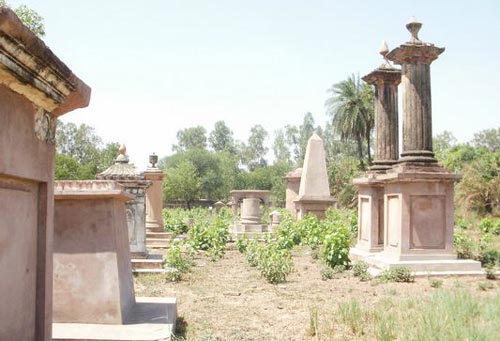European Cemetery

Information on European Cemetery (Ambala, Haryana) - History & Architecture
European Cemetery is the lesser known graves in India. These graves were formed under the colonial period of India, which were kept secret for many years, of those peoples buried here. This is the largest grave in the Northern region of India. The graves found here are the war heroes of Africa, British soldier's prisoners of war and its company officials. It is located in the Cantonment Area, Jagadhri Road, Ambala City, Haryana District found in Northern parts India.
European Cemetery Architecture
European Cemetery is a British built cemetery in Ambala. This grave land occupies nearly a 10 Hectares of surface land area in the Ambala Cantonment area. Many of the British graves are found in the European model. These have cubic and rectangular domes laid on the deceased. There are obelisk structures found on the higher officials served for British India. The prisoners of war and soldiers are laid here with simple cement made cross structures on their burial places. The entrance of this grave is built with two large cylindrical pillars with triangular dome on it. This has an iron grilled gate on it. Most of the grave blocks made here of granite stones, clay bricks, sand stones and few are placed with marble stones. The general graves here are just simply marked with cross made of cement and jelly stones. There is a chart list in marble stone, which has encryption of the deceased who were buried here. Presently it is under the St Paul's Church of Roman Catholic order, which maintain these 2 lack grave found here.
European Cemetery History
European Cemetery is formed around the 19the century by the British East India Company (BEIC) officials serving the defense force in India. This grave was the result of the great Boer War happened in the South African countries from 1880 AD to 1881 AD and 1899 AD to 1902 AD. This was fought between the Bore Farmers of these settlements against the British colonial rule. This was a massive civil fight with British, which is also known as the Anglo Boer War in the world history. This involved many loss of civilian life and the many British soldiers were killed in this five year war time. To curb the war situation the BIEC ordered to capture its revolt civilian and solders and send them to its various colonial countries like Sri Lanka, India and Indonesia by Sea on large ships. These civilians and soldiers were put in various prisons very secretly. In India they brought them to Ambala prison and many were executed and buried here. The other Africans and Bore farmers, who were not able to return to their mother country, spent their rest of their life time in India. These peoples also preferred to be buried here along with their country men's. The British Indians who permanently settled here was also laid to rest here. It came to light in the near independence time when one of the British brigadiers went to pay homage to the great British War heroes of Anglo Boer War. This was the time that Indian came to know of these mass burials of war prisoners and a Great War soldiers were buried here. After independence of India a Roman Catholic Church who served its ritual and ceremony under took it's in charge along with the archeological department and maintain it well know.
European Cemetery Tourism Importance
European Cemetery in Haryana is a protected monument of historic importance carrying the memories of Anglo Bore War held in South Africa. This place comes under Large Grave category of European Colonia Era in the tourist chart of Haryana tourism. This is also the resting place of the last BIEC officials and their families served in India.
- Andaman Nicobar Monuments
- Andhra Pradesh Monuments
- Assam Monuments
- Bihar Monuments
- Chhattisgarh Monuments
- New Delhi Monuments
- Goa Monuments
- Gujarat Monuments
- Haryana Monuments
- Himachal Pradesh Monuments
- Jammu and Kashmir Monuments
- Karnataka Monuments
- Kerala Monuments
- Madhya Pradesh Monuments
- Maharashtra Monuments
- Odisha Monuments
- Punjab Monuments
- Rajasthan Monuments
- Tamil Nadu Monuments
- Telangana Monuments
- Uttar Pradesh Monuments
- West Bengal Monuments